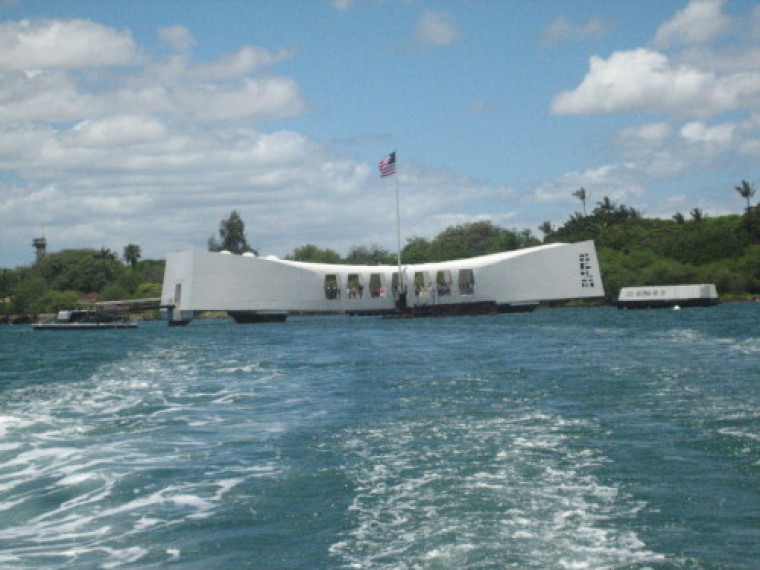
The experience was one of mixed feelings, as beneath the Memorial which stands over the sunken vessel are the remains of 177 entombed US Navy Sailors, yet perhaps all this destruction of life and property could have been avoided if the politicians of the day, on both sides, could have come to some accommodation to Japan's not unrealistic need for raw materials for its industries.
Of course, there could never be assurances that the resources would not be used for military might – we will, unfortunately, never know what intelligence and fears those politicians had at that fateful time.
Nonetheless, even today, eighty years since 1930, Japan remains totally dependent on the importation of raw materials. This has always been the crux of the Japanese dilemma, raw material security.
Did all these young men and women have to die on the 7 December 1941 when the Japanese made their surprise attack on Pearl Harbour and subsequently the millions lose their lives in the Pacific War conflict which culminated in the first every Atomic Bomb being dropped on Hiroshima?
This Pacific War was initiated, many now believe, when the then US President Franklin D Roosevelt signed into law the prevention of oil sales to Japan when the Japanese refused to leave off their invasion of China. They did the most horrendous things in China and Korea, equal to or worse than the Nazi regime.
The superiority complex doctrinisation of the Japanese provided a ruthless streak and their willingness to sacrifice all for the Emperor of Japan was indiscriminately utilised by their leaders in their aim for regional and ultimately world domination. This likewise reflected on why Japan were not signatories to the Geneva Convention. There was an inherent malicious contempt for the conquered.
Nonetheless the League of Nations only condemned Japan rather than trying to find a reasonable face saving avenue for the Empire of Japan. In the end, the Japanese walked out of the League of Nations and a Pacific War then seemed inevitable.
The question remains however, how much serious political effort was put into trying top find a peaceful solution to the Japanese problem of raw materials. Today, Australia pours ship load after ship load of raw materials into Japan. When Australia in the late 1930's sent raw materials to Japan against a background of union uproar, then Prime Minister Bob Menzies was castigated. There were no easy solutions.
There is a body of opinion now abroad asking the difficult question. Would have the Japanese militarists had the opportunity to take control of the Japanese Government had a real and lasting 'trade' solution been found to feed the industrial might of the Japanese steel mills.
Instead of tanks and planes and guns, the Japanese Empire may have produced for the world's market place the white goods and motor vehicles. This was achieved 'two decades later' with the post war boom from the 'ashes of defeat'. These are really awkward questions today as there remains injury in the hearts of many who suffered at the hands of the ruthless Japanese war machine.
But if the West was afraid of their business acumen in manufacturing before the Pacific War, the West is at the mercy of the Japanese and other Asian industrial giants today.
But in the 1930's the ball was rolling and gathering pace toward war. It could not be stopped. The Americans however, with all their decoding wizardry were unable to pin point where and when the first attack by the Japanese would come.
Japan needed oil and to the Dutch East Indies (now Indonesia) they went. To ensure the US fleet would not interfere, a plan was hatched by the Japanese to neutralise the US fleet in Hawaii at Pearl Harbour.
History reveals that the Japanese attack on Pearl Harbour 'in reality' failed as their main prizes, the US Aircraft Carriers were all out of port delivering planes to Wake Island and Midway. The day of the Battleship was over in any case.
The USS Arizona Memorial was certainly a time to reflect on several significant issues.
First, those sailors who lost their lives. War produces irreversible outrage's of every kind. Second, the illusive solution to Japan's need for raw materials. What might have been? Third, aggressiveness comes in many forms. Military and Political and there are many pitfalls with both and innumerable unforeseen consequences.
But once War was initiated, the sacrifices to return the world to peace became unimaginable yet absolutely necessary. Let there be no mistake, Japanese rule proved itself to be utterly unworthy. They disgraced their themselves and their history. Their politic needed to be raised to the ground. And it was!
After the war and peace returned to the world, the guns were turned back into ploughshares. 'Peace' is the overwhelming sentiment of this astonishing USS Arizona Memorial.
Little wonder the Scriptures speak of Christ that brings a peace that passeth understanding.